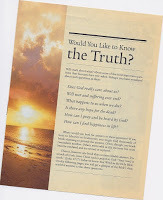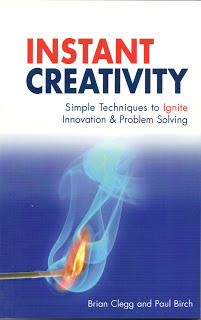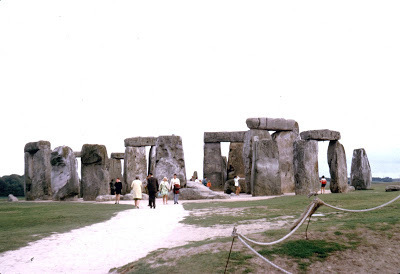Brian Clegg's Blog, page 143
May 4, 2012
Youth must adventure
 The kind of engine that pulled us to Edinburgh (a Deltic)
The kind of engine that pulled us to Edinburgh (a Deltic)- ugly things, but they made a great noiseI heard on the radio the other day that one of the reasons that young people aren't getting as much exercise these days is because their over-protective parents don't want them to go out. It's too risky. This is very silly - young people have to have adventures.
When I was fifteen, with two friends, I spent a week away from my parents on the railways. We all liked railways and we decided we were going to get the most you could out of a one week railrover, a ticket that allowed you to go anywhere on the railway network. Our timetable was superb. We even managed to include two of the great trains, the Flying Scotsman (the named train, not the engine) and the Cornish Riviera Express.
From leaving a grey Manchester on that week we travelled to London (several times), Edinburgh, Aberdeen, Inverness, Glasgow, Cardiff, Birmingham, Salisbury and Penzance (amongst others). I admit we didn't do a lot of sightseeing. In the entire week we only left the rail network twice - one night at Salisbury Youth Hostel and one night at Lands End Youth Hostel (we had to get a bus to this from Penzance, which was the only bit of our timetabling that let us down). Apart from this we slept on trains, except for one horrible night spent until 5am on Cardiff Station, a truly terrible experience.
Okay it wasn't anything special - but it was an adventure. You really see a country from the railway, more so than from the road, and we might not have got off the system much - but we really took the place in. There was even the need for a little crafy deception. Back then the YHA didn't let you stay in their hostels if you weren't walking. We had to pretend we were hikers, then sneak off to the station, which felt very wicked.
Perhaps not very exotic. And yet our parents had let three 15-year-olds out on the loose for a whole week. We had been in plenty of evil big cities. They had no idea what we were doing about eating and sleeping - we organized everything ourselves. We didn't have mobile phones, so they had to make do with a couple of calls from phone boxes. They were no doubt totally stressed - but they let us do it. We had an adventure.
Was there risk? A little bit. But it was so worth it. Risk means that things will go wrong occasionally - that's life. It involves risk. Every time you do anything original or creative you take a risk. If you let young people have adventures they will sometimes get hurt, sometimes even get killed. But very, very rarely in the UK. We are so lucky that adventures here are relatively safe. And we ought to be letting our young people have them, however painful it is for us parents.
Picture from Wikipedia
Published on May 04, 2012 00:24
May 3, 2012
I Hypocrite
Not long ago I did a post about not having the patience to watch book trailers, so there is a certain amount of irony that my publisher has kindly produced one for my latest masterpiece,
The Universe Inside You
.
At first glance this might seem a touch hypocritical. One minute I'm slagging them off, the next I'm doing one. But in the end, it was fun to do ('Hey, I'm the centre of attention, this can't be bad!'), and it does demonstrate a little bit about why I think there's so much fun to be had with the human body (settle down in the back row) and why it makes a great linking theme for a science book.
So if you've got more patience than me (it's not very long), here it is:

At first glance this might seem a touch hypocritical. One minute I'm slagging them off, the next I'm doing one. But in the end, it was fun to do ('Hey, I'm the centre of attention, this can't be bad!'), and it does demonstrate a little bit about why I think there's so much fun to be had with the human body (settle down in the back row) and why it makes a great linking theme for a science book.
So if you've got more patience than me (it's not very long), here it is:
Published on May 03, 2012 00:38
May 2, 2012
The Archers and the objectification of men
 I'm sure the title of this post would make an excellent PhD thesis. I was listening to the Archers omnibus on Sunday and struck by the remarkable sexism that was going apparently totally unnoticed. The cricket club has a very attractive new coach and we were hearing how women were attending practice just to watch him, and the gay characters were commenting on his attractiveness and how the women had turned up because they wanted to see him in his cricket whites (nudge, nudge, wink, wink).
I'm sure the title of this post would make an excellent PhD thesis. I was listening to the Archers omnibus on Sunday and struck by the remarkable sexism that was going apparently totally unnoticed. The cricket club has a very attractive new coach and we were hearing how women were attending practice just to watch him, and the gay characters were commenting on his attractiveness and how the women had turned up because they wanted to see him in his cricket whites (nudge, nudge, wink, wink).If a load of men turned up to see a new female hockey coach in her kit they would be rightly accused of being a load of perverts. So why the double standards?
It's the same on TV shows judged by a panel. It seems absolutely fine for female and gay judges to keep making suggestive remarks about the men, but it would rightly be frowned on if similar comments were made about the women.
I appreciate the 'You've done it to us for so long, now it's time to get our own back' argument, but I don't agree with it. Two wrongs don't make a right. We might not be perfect at it, but it is broadly accepted in the mainstream media that the objectification of women is wrong. Surely it's time there was parity for the men?
Image from Wikipedia
Published on May 02, 2012 00:54
May 1, 2012
A floppy what?
 The sad remnant of my diskette collectionI was watching the first series of 24 the other day on my mission to use Netflix to catch up with the good stuff I never saw the first time around. At one point someone needs to get information from one computer to another. She puts a black rectangular object into a drive and uses this to pass the information. I swear this is true: for just a moment, I thought 'What's that?' It was, of course, a diskette, something that was central to our computing lives only a few years ago and yet, to all intents and purposes, disappeared off the face of the planet more rapidly and completely than black vinyl records ever have.
The sad remnant of my diskette collectionI was watching the first series of 24 the other day on my mission to use Netflix to catch up with the good stuff I never saw the first time around. At one point someone needs to get information from one computer to another. She puts a black rectangular object into a drive and uses this to pass the information. I swear this is true: for just a moment, I thought 'What's that?' It was, of course, a diskette, something that was central to our computing lives only a few years ago and yet, to all intents and purposes, disappeared off the face of the planet more rapidly and completely than black vinyl records ever have.I had a sudden wave of nostalgia for floppy disks and diskettes. At one point I ran the PC department of a certain large airline whose initials include B and A. We genuinely did get those old hoary misuse stories of the 5 1/4 inch floppies. People really did occasionally staple them to a report. And one user really did complain that their disk wouldn't read when they shoved it into the gap between two drives.
When the rigid 3 1/2 inch diskettes came along, confusingly still called floppies by many, it was wonderful. They were much harder to damage, you could slip them in your pocket, they held about four times as much data (yes, children, over a MEGABYTE per diskette) - they were great. Unlike floppies they protected the read area of the magnetic disk, where floppies left it open for prying fingers and dirt. I used to have cases on my desk especially made to hold diskettes. I backed up onto diskettes. (And yes, after the hard disk failed twice on my IBM AT, I really did back up with some fervour on the more modern machines that took diskettes.)
And yet now they're gone. We don't have a computer in the house that takes them, though I do have an external diskette drive left over from an old Sony laptop that was too slim and sexy to have a built-in drive. And yes, in the drawer if I dig around, I do have one or two diskettes left. But even so - how the mighty have fallen.
Published on May 01, 2012 00:41
April 30, 2012
What exactly are they witnessing?
 At tract ive?In 14 years at our previous house, thanks to its relative isolation, we never got Jehovah's Witnesses at the door once. Now, in a more cosmopolitan area, we get them regularly. In my head, beforehand, I am happy to engage them and challenge them on their own level - but somehow when they turn up I crumble. So there was that jolly smily person with the neat opening line:
At tract ive?In 14 years at our previous house, thanks to its relative isolation, we never got Jehovah's Witnesses at the door once. Now, in a more cosmopolitan area, we get them regularly. In my head, beforehand, I am happy to engage them and challenge them on their own level - but somehow when they turn up I crumble. So there was that jolly smily person with the neat opening line:'Do you ever think about the Lord's Prayer?'
And all I could do was mutter (after a bit of a pause) 'I'm afraid I'm at work.'
So, with their usual politeness and lack of pushiness, they gave me a tract and left. In fact the one occasion when I've desperately wanted to invite Jehovah's Witnesses in (for the only time in history it was two incredibly attractive women), I was at home ill with flu and had to send them away.
Usually the tract goes straight in the bin, with the usual observation about look and feel. I don't know why it is, but material like this from the US always has a look and feel that seems very old fashioned. But this time I happened to glance through it. Given they'd mentioned prayer, my eye was caught by a section on prayer. I don't know the Bible off by heart, but I have read it and am familiar with most of the key bits, and something seemed wrong with the quote they had used. It says:
Jesus taught us to avoid repeating set formulas in our prayers. "When praying," he said, "do not say the same things over and over again." (Matthew 6:7).It just didn't seem right. So I dug out the real thing. It actually says
'In your prayers do not go babbling on like the heathen, who imagine that the more they say the more likely they are to be heard. Do not imitate them. Your Father knows what your needs are before you ask him...' And then it gives the Lord's Prayer.Now of course all English bibles are translations. My version, the out-of-favour New English Bible will be different from the US version they used. But I think their 'translation' reverses the meaning. Our JW's are saying it says 'don't use a set formula', where the text actually says 'don't go on and on with miles of specific detail, just use a set formula (and here it is)'.
What is fascinating here - and I think it's something we should bear in mind when anyone of any religion says they are doing something because that's what scripture says - is how easy it is to take the same original text and put two very different interpretations on it - in this case pretty well opposite interpretations. I almost felt like running after them and finding them and pointing this out. But I didn't.
Published on April 30, 2012 00:29
April 27, 2012
Go creative for Friday
 Before getting into popular science books I wrote a number of business books on being more creative in business. Not how to paint a nice business-related picture, but how to generate ideas and solve problems in a business context. My book of creativity techniques,
Instant Creativity
, written with Paul Birch is still a steady seller and I thought it would be entertaining to give you a little technique from it to try out.
Before getting into popular science books I wrote a number of business books on being more creative in business. Not how to paint a nice business-related picture, but how to generate ideas and solve problems in a business context. My book of creativity techniques,
Instant Creativity
, written with Paul Birch is still a steady seller and I thought it would be entertaining to give you a little technique from it to try out.You can do this individually or in a group. Pop over to an 'on this day' website - if you don't know one, try the BBC's or this rather encyclopedic site. Pick out two or three entries that appeal because they are bizarre, exciting or just make you think of something. Typically the dates in such lists represent an event in history, or the birth or death of a person. Imagine yourself present at the event, or being that person. How would you look at the problem? What would you do about it? What different perspectives would you get from being at the event or from the sort of activity that was typical of this person? Would the period of history involved generate any misunderstandings?
Combine different ideas from different sources. Be prepared to treat them as a starting point, rather than a final solution.
Like most creativity techniques the approach here is to give you a different starting point so you come at a problem or need for a new idea from a different direction. The mix of people and events should give a source of inspiration (and it can be a bit of fun too). If you wanted to extend the technique you could try combining events to interesting effect. What would the painter Gaugin do about your problem if he had just seen the first Zepplin destroyed? What would Richard the Lionheart (or Harry Houdini) make of the first Olympic Games, and how would it inspire him?
You can find out more about Instant Creativity and whole bunch of other books on improving business creativity on my creativity books page.
Published on April 27, 2012 01:05
April 25, 2012
Randi science
 I admire the work James Randi does in debunking fake mentalists and demonstrating how easy it is for trained magicians to pull off the same stunts, though I do find that his in-your-face words can have something of a Dawkins effect - they can put people off by being insulting.
I admire the work James Randi does in debunking fake mentalists and demonstrating how easy it is for trained magicians to pull off the same stunts, though I do find that his in-your-face words can have something of a Dawkins effect - they can put people off by being insulting.I've recently read his old but still entertaining book, Flim Flam (tip - the Kindle version is a lot cheaper than paper equivalents). It is an effective dismemberment of various claims to supernatural and paranormal abilities and events. It might seem at first sight he over-analyzes some cases. For example he spends page after page on the detail of the Conan Doyle fairy photos. This might appear unnecessary, because those pictures are so obviously fakes - the images of the fairies are quite clearly paper cutouts. Yet Randi usefully examines the different ways those who were apparently taken in by these crude fakes supported their beliefs and ignored the obvious.
However, I do notice one thing. Randi is understandably heavy on scientists who have a tendency to be naive when presented with fakery. It isn't their field. But because of this, he ought to be careful himself when writing about science, because his opinions in the scientific arena can be more than a little naive too. I found one example rather entertaining. Randi writes:
Jack van Impe, a TV evangelist who perspires and preaches his version of science regularly to millions of believers, recently gave us an Easter message that reflected his ignorance of science. He referred to the preposterous "Jupiter Effect" so beloved of some nuts, which is supposed to cause wonderful catastrophes in 1982. The Earth should be a mess at the end of this claimed alignment of the planets, and I can hardly wait to see the show. Said Jack, "The Earth will be seven times hotter." Codswallop. The term has no meaning. "Seven" is a number, Jack. If you take the normal temperature to be 70 degrees Fahrenheit, that makes the new reading 490 degrees Fahrenheit. If you're in Europe or Canada, that same temperature is 21 degrees Celsius, giving the other folks a break with 148 degrees C, which is equal to only 298 degrees F.Yes, of course seven is a number - but that doesn't mean that something can't be seven times hotter than something else. Temperature is a measure of the mean kinetic energy of the atoms or molecules in a substance, and one thing can have seven times as much energy as another. So something can be seven times hotter than something else. (Or the world can be seven times hotter at one point in time than it is at another.) What Randi is really identifying is the arbitrary nature of the temperature scales he uses in his illustration. (And the stupidity of the prediction.) But the way he phrased his attack shows that he too can get it wrong when working outside his field of expertise.
Image from Wikipedia
Published on April 25, 2012 23:54
The universal postal myth
 I was listening the other today to someone from the Royal Mail moaning about competing services cherry picking and doing the lucrative postal deliveries inside London, while the poor old Royal Mail had to do all the difficult expensive stuff. And this had to be the case because of the need for a universal post, which 'everyone agrees' is essential.
I was listening the other today to someone from the Royal Mail moaning about competing services cherry picking and doing the lucrative postal deliveries inside London, while the poor old Royal Mail had to do all the difficult expensive stuff. And this had to be the case because of the need for a universal post, which 'everyone agrees' is essential.Well, I don't think everyone does agree. I, for one, don't think it is essential.
Think about it. Would you expect to pay the same price for a bus into town and to get to Edinburgh? Hardly. Why should mail be any different? We understand we need to pay more to send a letter to, say, Hong Kong - why shouldn't it cost more to send it somewhere far distant and expensive to reach in the British Isles.
Yes, you might say, but what about the poor people who live at the furthest reaches of the UK? What indeed? They have every right to live there. But I'm not sure they have a right to expect me to subsidise their postal service every time I send something just down the road to Salisbury.
I think part of the problem with the universal post system is the lack of creativity applied to getting around the practical difficulties of doing anything different. At first sight you might imagine it would be a nightmare, having to work out how far it is to your destination. And it would be if you did this (although the railway manages to operate a fares system that copes - and so could the Post Office). But here are two easy-to-implement alternatives:
Simple banding. Anything to the same postcode letters is local, anything in the same country is country, anything to a different country within the UK is crossborder. Three bands, automatically detectable from the postcode. Easy peasy.Receiver pays. This is the more interesting idea. Still have a universal price to send a letter anywhere in the UK. But if you live more than a certain distance from the nearest sorting office, you pay a premium to receive your post (or go and collect it for free). This would be fiddly to do on a per-item basis, but could be simply implemented monthly or annually through the council tax collection.If we moved away from a universal pricing system, we could then get proper competition in the postal system and Royal Mail wouldn't be able to whinge about other companies cherrypicking as they would be adequately compensated for the difficult-to-get-to destinations and could provide a competitive base price for the local stuff. It would probably bring down the cost of many mail items.
It's not perfect - it's top of the head, 5 minutes thought stuff, I admit it. There would be extra complications. But the fact is that the idea of having a single price for a letter to anywhere in the UK is not sacrosanct, it is not written into the constitution (hardly surprising when we don't have a written constitution), and it's not necessarily the best way to go about things. It is at least worth thinking about the alternatives, rather than taking the usual stick-our-heads-in-the-sand approach.
Image from Wikipedia
Published on April 25, 2012 00:20
April 24, 2012
Don't hide the A303
 Stonehenge when I first visited and you weren't kept outEvery now and then there is a scheme to send the A303, the main road that passes Stonehenge, through a cutting or a tunnel. The idea is that it means those visiting this stunning ancient monument don't have to see traffic rumbling past. However, I think this suggestion gets things totally back to front.
Stonehenge when I first visited and you weren't kept outEvery now and then there is a scheme to send the A303, the main road that passes Stonehenge, through a cutting or a tunnel. The idea is that it means those visiting this stunning ancient monument don't have to see traffic rumbling past. However, I think this suggestion gets things totally back to front.First of all, it's silly to think that somehow you would be able to lose yourself in neolithic times if only the road were hidden. That might have been the case in my youth, when you could wander around the stones to your hearts content. But now you are kept a good distance away by a fence (unless you have some ridiculous druidical religious belief (largely made up in a pub in London in Victorian times - I've seen the plaque), in which case you can trample all over the ancient monument that has nothing to do with your 'religion'). This forces a visit to Stonehenge to be a 21st century experience, so just accept it.
The reason I say the idea of burying the road gets things back to front is that I think it takes the wrong viewpoint. I drove down the A303 to and from the Brympton Festival on Sunday and it was totally wonderful getting that heart-stopping view of the monument as I drove past each way. If they put the road in a cutting or tunnel, thousands of people a day would miss out on that stunning view of Stonehenge - and I think that outweighs any prissy attempt to make the visitor experience better.
Keep that wondrous view from the road, please!
Published on April 24, 2012 01:52
April 23, 2012
Festival fun
 Brympton House, location of the festival - gorgeous buildingI spent Sunday at the Brympton Festival near Yeovil. It was an interesting experience. This was the first attempt at this festival and inevitably the organizers were on a bit of a learning curve. It was a lovely venue and a very warm and friendly experience (the festival is still running until Thursday with some excellent speakers to come, so do get along if you can). And, unusually for such events, there was brilliant food. But the organisation was a bit mixed - part of the problem being, I think that the programme was too complicated and also because day ticket holders don't seem to have had to pre-book events, meaning the organisers had no idea who would turn up at any particular talk.
Brympton House, location of the festival - gorgeous buildingI spent Sunday at the Brympton Festival near Yeovil. It was an interesting experience. This was the first attempt at this festival and inevitably the organizers were on a bit of a learning curve. It was a lovely venue and a very warm and friendly experience (the festival is still running until Thursday with some excellent speakers to come, so do get along if you can). And, unusually for such events, there was brilliant food. But the organisation was a bit mixed - part of the problem being, I think that the programme was too complicated and also because day ticket holders don't seem to have had to pre-book events, meaning the organisers had no idea who would turn up at any particular talk. Numbers were quite low overall, and I did wonder just how many literary festivals the UK can support - I would say this one deserves to keep going more than a fair number of festivals that I have attended, but there has to be a point where festival fatigue sets in.
Because the venue was so unique (it's worth going just to see the house) I do want to just reflect on the remarkable opportunity to experience life as it was in a great house 100 years ago. The speakers' hideaway room was a remarkable drawing room. It must have been about 20 feet high and at least 30 feet square. As far as I could detect, the only heat came from the roaring fire in the sizable fireplace.
 The speaker's drawing room
The speaker's drawing roomThis led to the bit that was fascinating - the realization that in a big house in Victorian times it was COLD. Sitting on the sofa on the left of the photo (that's my book), fairly near the fire, I was just about okay. But I still felt the need to occasionally come close to the fire and warm various bits - in fact I recreated that traditional Victorian image of standing in front of the fire warming up. They really did have to do it.
For me, it was worth going for this experience alone. (Not to mention a toilet that Queen Victoria would have recognized.) Lovely.
Published on April 23, 2012 03:15



